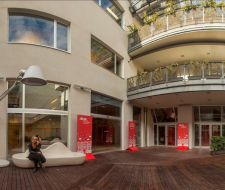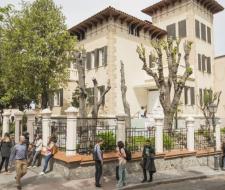Universities in Spain 2024
- Education information
- Universities in Spain for international Students
- Structure of Higher Education in Spain
- How to choose best Spanish universities with SMAPSE Experts
- English-Language Programs in Spanish Universities
- Staff and Academic Careers in Spain
- Balancing Work and Study in Spain
- Cost and Fees to Spanish universities for International Students
- How to Apply to Universities in Spain for International Students
- Literature and references
This content was developed with active participation of Steve Smith.
In the process of preparing the material, we referenced the following sources:
- https://www.inclusion.gob.es/oberaxe/es/publicaciones/documentos/documento_0153.htm
- https://gpseducation.oecd.org/CountryProfile?plotter=h5&primaryCountry=ESP&treshold=5&topic=EO.
-
 Top-50 best Marketing programs in the world
Top-50 best Marketing programs in the world SpainBarcelonaCurrently watching: 9from 4900.00 € / semesterApply with documents
SpainBarcelonaCurrently watching: 9from 4900.00 € / semesterApply with documents -
 #4 for Hospitality and Leisure Management in the world
#4 for Hospitality and Leisure Management in the world SpainMarbellaCurrently watching: 6from 18600.00 € / yearApply with documents
SpainMarbellaCurrently watching: 6from 18600.00 € / yearApply with documents -
 Top 25 Best Fashion Universities in the World
Top 25 Best Fashion Universities in the World SpainMadridCurrently watching: 6from 13200.00 € / yearApply with documents
SpainMadridCurrently watching: 6from 13200.00 € / yearApply with documents -
 The university ranks the position 17th as one of the Top 25 Best Fashion Universities
The university ranks the position 17th as one of the Top 25 Best Fashion Universities SpainBarcelonaCurrently watching: 6from 16400.00 € / yearApply with documents
SpainBarcelonaCurrently watching: 6from 16400.00 € / yearApply with documents -
 Awarded as Four Stars Institution
Awarded as Four Stars Institution SpainBarcelonaCurrently watching: 6from 6900.00 € / yearApply with documents
SpainBarcelonaCurrently watching: 6from 6900.00 € / yearApply with documents -
 from 4900.00 € / semesterApply with documents
from 4900.00 € / semesterApply with documents -
 from 5450.00 € / semesterApply with documents
from 5450.00 € / semesterApply with documents -
 from 6285.00 € / yearApply with documents
from 6285.00 € / yearApply with documents -
 1st Spanish university and the 10th best university in the world
1st Spanish university and the 10th best university in the world SpainBarcelonaCurrently watching: 4from 2600.00 € / 4 monthsApply with documents
SpainBarcelonaCurrently watching: 4from 2600.00 € / 4 monthsApply with documents -
 Obtaining American degree in Europe
Obtaining American degree in Europe SpainMadridCurrently watching: 5from 10880.00 € / semesterApply with documents
SpainMadridCurrently watching: 5from 10880.00 € / semesterApply with documents
Alternative destinations
Education information

Spain is included in the list of the top 3 most popular destinations among foreign students for higher education. Education in the Iberian Peninsula attracts students from all over the world by high quality and affordable tuition fees. Private and public universities are open to foreign students, but the cost of studying is different - as a rule, state education is cheaper, but studying is conducted only in Spanish. The price of higher education is almost twice as low compared to advanced British universities. In addition, for a long period of its development, Spain is characterized by a rich culture and history. It is also worth noting that some of the leading universities in Spain are included in the ranking of the TOP 200 best universities in all countries of the world according to 2016, which was compiled by the Times Higher Education World University Rankings.
Higher education in Spain is presented by:
-
Bachelor program;
-
Master program;
-
Exchange programs,
-
Doctoral degree educational program.
Universities in Spain for international Students
Spain boasts a rich tapestry of prestigious universities, with many holding historical significance as some of the world's oldest. Nearly a third of these institutions are private, yet their programs largely mirror those of public universities. Foreign students also have the unique opportunity to enroll in religious universities, which, in addition to mainstream disciplines, offer a deep dive into religious history. These universities, often more affordable, cover a range of classical subjects:
-
Latin language
-
Geography
-
History
-
Philosophy
-
Philology
-
Physics
Depending on the institution, students can either delve into humanities or take up applied disciplines. Furthermore, Spain's higher education scene is renowned for its specialized business programs, including popular MBA courses.


What criteria are guided by applicants when choosing a university?
When you view the ranking, pay attention not only to the general list and position of the university, but also to the ranking of a particular course, subject. It is also worth considering:
- The degree of satisfaction of students, what services are provided for them, the level of care and mentoring
- The level of employment of graduates, their opportunities in industry and business
- Content of courses, composition of subjects
- Teaching style
- The ratio of students and teachers.
Structure of Higher Education in Spain
Most universities, like those featured in SMAPSE's TOP-40 list, offer comprehensive programs spanning Bachelor's, Master's, and Doctoral studies.
Bachelor's Degree Programs:
-
Typically lasting 4 years, these programs often require term papers annually, culminating in a dissertation in the final year. Engaging in electives and university events further enhances the student experience.
Master's Degree Programs:
-
Spanning 1-2 years, Master's programs in Spain are categorized into professional, academic, and research tracks. While academic programs emphasize theory, research programs lean towards hands-on lab work.

-
Doctoral Studies:
A three-year commitment, this culminates in a Ph.D. After a year filled with lectures and seminars, students dedicate the subsequent years to dissertation work, defending it before a commission. Notably, these programs often find homes in advanced postgraduate colleges or top-tier research institutes.
How to choose best Spanish universities with SMAPSE Experts
SMAPSE's extensive catalogue showcases a variety of universities catering to different academic directions. Prospective students can use handy filters on the platform to sort by program type, location, or language of instruction. Additionally, SMAPSE provides personalized university recommendations tailored to individual preferences. Simply fill out their online application or reach out via email.

English-Language Programs in Spanish Universities
Spanish universities have adapted to global demands by offering numerous programs in English. Master's programs, in particular, see a surge in English-taught courses. Leading universities also roll out bilingual programs, mixing English and Spanish-taught subjects. To succeed, a proficiency level of English 6.0 (IELTS) is recommended.
Spain employs two grading systems. The first grades students on a scale of 1 to 10, with 4.9 being the pass mark. Achieving 9 or higher is commendable, accomplished only by a top 5% of students. The second system is a five-tier evaluation:
-
Suspenso (Failed)
-
Aprobado (Passed)
-
Notable (Very Good)
-
Sobresaliente (Excellent)
-
Matrículade Honor (With Honors)
Elite Spanish institutions often prioritize quality term papers and final works over exams, but oral exams, typically lasting around 15 minutes, are not uncommon.
Staff and Academic Careers in Spain
Spain's higher education ecosystem enables postgrad students to delve into research via ample grants from both the Spanish government and private entities. To kickstart a research career, one should possess a Ph.D. and certification from a National Evaluation Agency. To lecture, a special ANECA agency document is necessary, easier to obtain with over three years of research experience. Career advancement relies heavily on quality and quantity of research and teaching contributions.
Salaries in the educational realm vary:
-
Researcher: €1584/month
-
Lecturer: €2250/month
-
Associate Professor: €2700/month
-
Professor: €3600/month
Balancing Work and Study in Spain
With a student visa, international students can work up to four hours daily. Formal employment necessitates submitting documentation, including a passport, academic record, and employment contract, to the local prefecture. It's paramount to ensure that work and studies don't clash. While securing flexible work can be challenging, many foreign students turn to freelancing, enjoying the comfort and flexibility of working from home.
Cost and Fees to Spanish universities for International Students
Spain is increasingly becoming a sought-after destination for international students due to its world-class universities, vibrant culture, and relatively affordable higher education system. While the country's tuition fees are generally lower than those in the UK or the US, the costs can vary significantly based on several factors, including the type of institution, the course of study, and the student's nationality.
For public universities, international students from outside the European Union (EU) or European Economic Area (EEA) typically pay higher tuition fees than domestic or EU/EEA students. On average, undergraduate programs can range from €700 to €2,500 per academic year for EU/EEA students, while non-EU students might pay anywhere from €2,000 to €12,000, depending on the course and university. Master's and doctoral programs, being specialized courses, often come with higher fees, ranging from €1,500 to €3,500 for EU/EEA students, but can be between €3,000 to €20,000 for non-EU students.
Private universities, on the other hand, have their own fee structures, and international students can expect to pay between €6,000 to €18,000 annually, again depending on the course and institution. Apart from tuition, potential students should also account for living expenses. Major cities like Madrid or Barcelona can be more expensive, with monthly living costs averaging €1,000 to €1,500, while smaller cities and towns might be more affordable. Additionally, international students must remember costs associated with health insurance, which is mandatory for visa and residency purposes.
How to Apply to Universities in Spain for International Students
Spain, renowned for its vibrant culture, historic landmarks, and quality higher education, attracts thousands of international students each year. The application process, while methodical, is fairly straightforward, but it's crucial for students to be thorough and punctual in their submissions.
The first step in the application process is to select a university and specific program of interest. Once this is decided, students must obtain the application form, usually available on the university's official website. Most Spanish universities require international students to have their prior academic credentials recognized by the Spanish government. This process, called "homologación", might take some time, so it's advised to start early. Additionally, students will typically need to provide certified translations of their academic transcripts, letters of recommendation, a statement of purpose, and possibly sit for entrance exams or interviews. Proof of Spanish language proficiency, like the DELE (Diploma de Español como Lengua Extranjera), is often a requirement, especially for programs taught in Spanish. However, many universities also offer courses in English, particularly at the postgraduate level.
International students, particularly those from outside the EU/EEA, will also need to apply for a student visa. This requires acceptance from a recognized Spanish institution and proof of financial means to support oneself during the study period. Health insurance, either private or public, is a mandatory requirement for the visa application.
In conclusion, while applying to Spanish universities as an international student involves several steps, careful planning and adherence to university-specific guidelines can simplify the process. Engaging directly with university admission offices or seeking guidance from education consultancies specializing in Spanish higher education can also be invaluable.
Top 15 best universities in Spain 2024
| 1 | Marbella International University Centre |
| 2 | EU Business School Barcelona |
| 3 | Les Roches Marbella |
| 4 | IED Madrid |
| 5 | IED Barcelona |
| 6 | Barcelona School of Management |
| 7 | Geneva Business School Barcelona |
| 8 | Saint Louis University Madrid |
| 9 | LCI Barcelona |
| 10 | School of Tourism and Hospitality Management Sant Ignasi |
| 11 | International Business School Barcelona (ESEI) |
| 12 | UCAM - Universidad Católica San Antonio de Murcia |
| 13 | INSA Business Marketing and Communication School |
| 14 | TBS Barcelona |
| 15 | BEBS Barcelona Executive Business School |
Top 15 best universities in Switzerland 2024
| 1 | Glion Institute of Higher Education Switzerland |
| 2 | Les Roches International School Montana |
| 3 | César Ritz Colleges Switzerland |
| 4 | IHTTI School of Hotel Management |
| 5 | Ecole Hoteliere de Lausanne |
| 6 | Geneva Business School |
| 7 | EU Business School Montreux |
| 8 | HIM Hotel Institute Montreux |
| 9 | Swiss Hotel Management School |
| 10 | Webster University Geneva |
| 11 | Business and Hotel Management School |
| 12 | Luzern IMI |
| 13 | Swiss Hotel Management School (SHMS) Caux |
| 14 | International University in Geneva |
| 15 | Culinary Arts Academy Switzerland |
Top 10 best universities in Netherlands 2024
Literature and references
- Universidades de España — Wiki
- Lista Forbes | Las 25 mejores universidades 2023 — Forbes
- Educación superior — Wiki
- Licenciatura — Wiki
- Trabajadores adolescentes — Bandera de la Unión Europea
- Overview of the education system
- Informe sobre la Integración de los estudiantes extranjeros en el sistema educativo español



